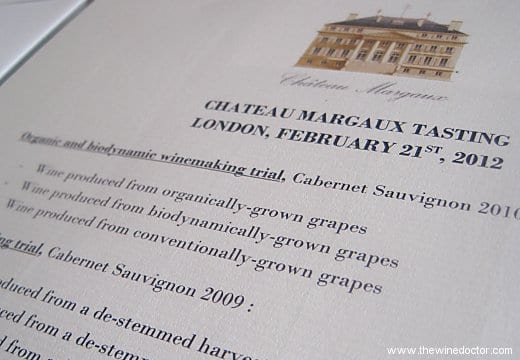Experimental Margaux: Conventional, Organic or Biodynamic?
Paul Pontallier opened with a clear statement of intent; he would like Château Margaux to be organic, or at least as close to organic, on as much of the vineyard as is possible. He feels they are very close to achieving that aim, one which Pontallier has held for 25 years. For the past 12 years the vineyards have been free of pesticide and insecticide, although he admits that at present they still spray chemical treatments against both mildews, downy and powdery, the latter also known as oidium. Nevertheless he hopes that in the next 2-3 years certain plots – those that feed into the grand vin – will be entirely organic (meaning replacement of these treatments with those compatible with organic viticulture, principally copper).
That he should begin with these plots is only natural, says Pontallier, as these are the plots with the best drainage and the most vigorous vines which are thus the least sensitive to mildew. The lesser plots (I can’t help feeling this is such a inappropriately damning phrase – many Margaux proprietors would sacrifice much to have possession of one of these ‘lesser’ plots) that generally feed into the second or third wines will remain conventionally farmed, for the moment at least. As for biodynamics, Pontallier is clearly very aware of it but obviously not convinced. He described his opinion of the differences between the two with some difficulty, looking tentative as he did so; I wasn’t sure if he was struggling to find the right words in English, or treading carefully in order to ensure he did not offend anybody. “Most of the differences“, he said, “are almost religious“.
The 1-hectare plot on which the farming experiment is carried out is planted entirely with Cabernet Sauvignon, and is “a typical Pavillon Rouge plot” says Pontallier; the wine made from these vines has never made it into the grand vin. This miniature vineyard is divided into multiple miniature plots, each one with several rows of vines; the first few rows are conventionally farmed, the second organic, the third biodynamic, and this pattern is then repeated across the vineyard. The vines were originally planted in the 1980s, although the farming experiment only commenced with the 2008 vintage and so as of early 2012 they have four vintages to examine.

Please log in to continue reading:
